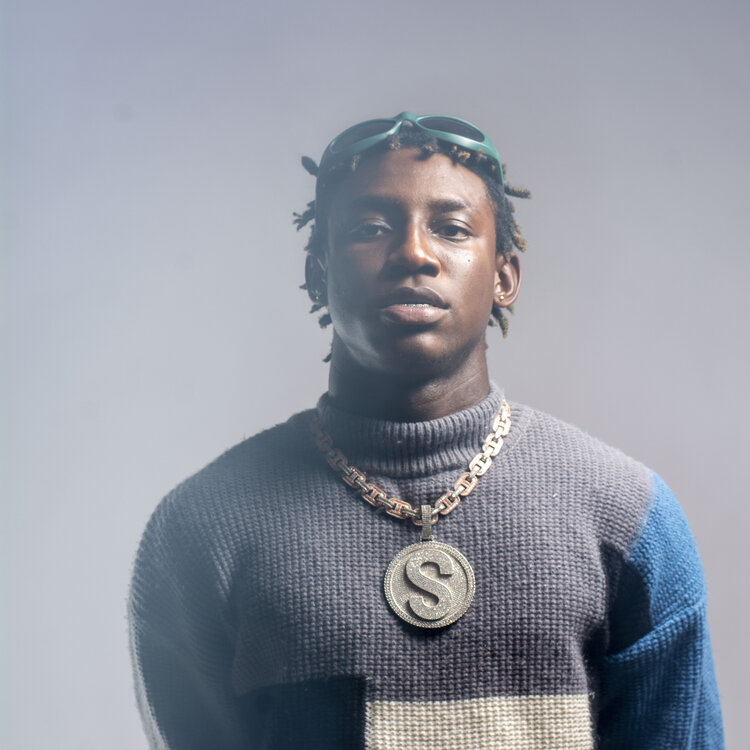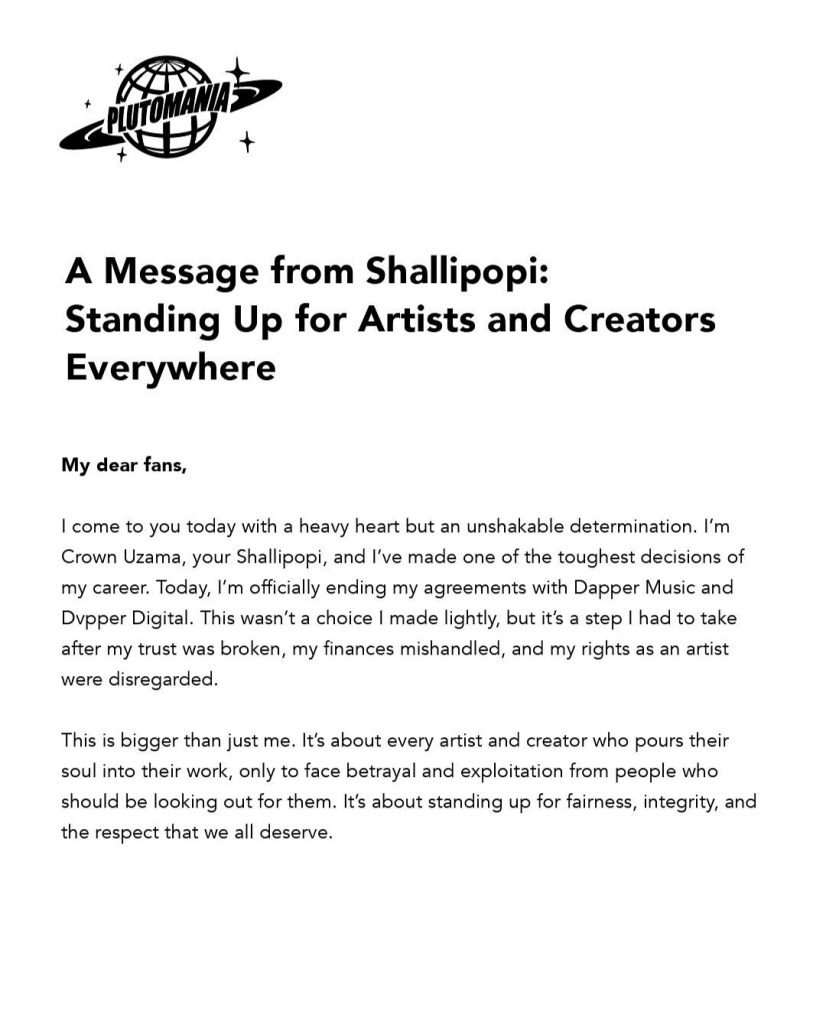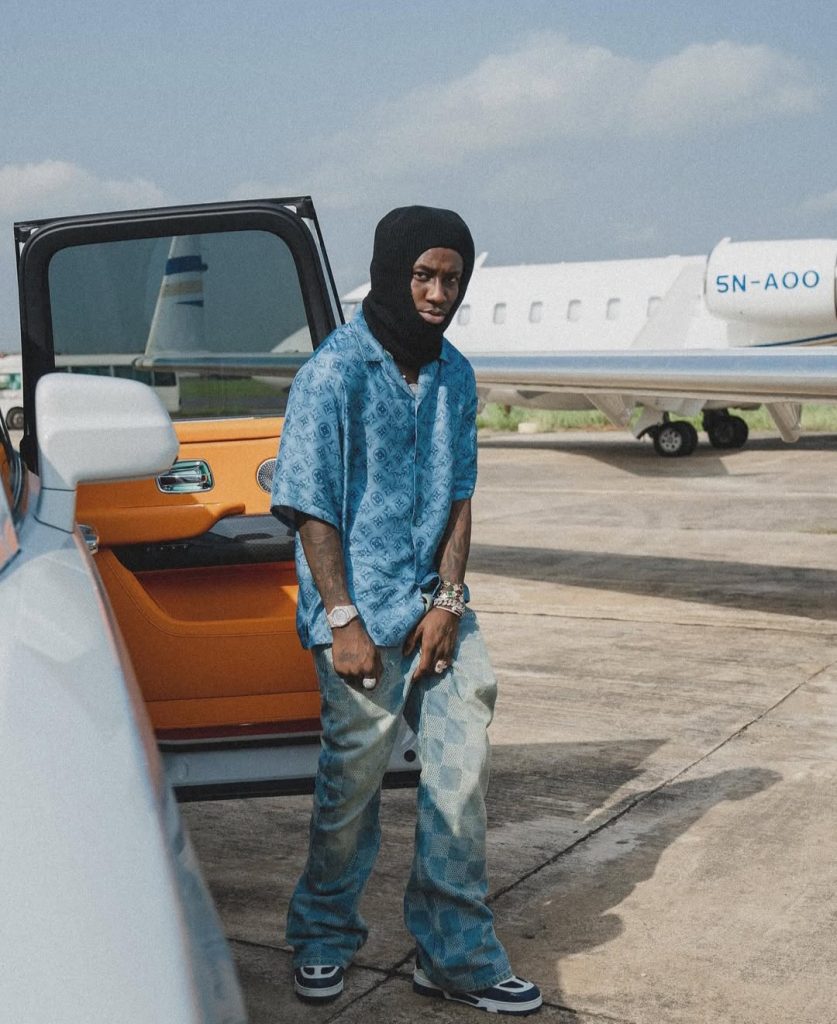Breaking Free: Shallipopi’s Bold Move and the Fight for Fairness in Nigeria’s Music Industry

The Nigerian music industry has long been a vibrant space of creativity and global recognition. Yet beneath the glitz and glamour lies a recurring narrative—artists at odds with record labels over financial transparency and exploitative practices. Crown Uzama, better known as Shallipopi, is the latest to add his voice to this ongoing struggle.
In a heartfelt announcement shared on his X handle on Wednesday, the artist declared his decision to part ways with Dapper Music and Dvpper Digital, citing mismanagement, lack of transparency, and what he described as exploitative contracts that hindered his growth and jeopardized his career.
This decision marks a pivotal moment for Shallipopi, who has also launched his independent record label, Plutomania Records, to reclaim control of his career and creative vision.
“I Had to Stand Up for Myself”
In a public letter titled “A Message from Shallipopi: Standing Up for Artists and Creators Everywhere,” the artist shared his reasons for this difficult but necessary move:
“I come to you today with a heavy heart but an unshakable determination. I’m Crown Uzama, your Shallipopi, and I’ve made one of the toughest decisions of my career. Today, I’m officially ending my agreements with Dapper Music and Dvpper Digital. This wasn’t a choice I made lightly, but it’s a step I had to take after my trust was broken, my finances mishandled, and my rights as an artist were disregarded.”

According to Shallipopi, Dapper Music, his management, brokered a deal with Dvpper Digital—a company reportedly linked to the same individuals behind his management. This conflict of interest, he alleged, prioritized profits over his growth, leaving him creatively and financially strained.
Further revelations pointed to mismanaged advances and an “unfair forever deal” that would entitle Dapper Music to 30% of his earnings indefinitely—even after the termination of their agreement.
“That’s not just unfair; it’s exploitation, and it is cruel,” Shallipopi stated.
An Industry-Wide Challenge:
Shallipopi’s story echoes the struggles of many Nigerian artists who have had to sever ties with their record labels after similar allegations. From Kizz Daniel’s battle to leave G-Worldwide over restrictive contracts to Runtown’s legal tussle with Eric Manny Entertainment, the list of artists who’ve faced these challenges is growing. These disputes often stem from opaque financial agreements, restrictive creative control, and exploitative revenue-sharing models.
For instance, Brymo, Tems, and Reekado Banks have all shared stories of disagreements over management or contract terms that limited their creative freedom. These examples reveal a systemic issue where record labels, in pursuit of profit, often undermine the very artists who drive their success.
A Call for Reform in Nigerian Music:
Shallipopi’s decision to break free is more than a personal victory—it is a call to action for fairness and integrity in Nigeria’s music industry.
“It’s about every artist and creator who pours their soul into their work, only to face betrayal and exploitation from people who should be looking out for them. It’s about standing up for fairness, integrity, and the respect that we all deserve,” he explained.
The broader picture is clear: Nigerian record labels must re-evaluate their relationships with artists, emphasizing transparency, fair contracts, and genuine collaboration. While labels provide crucial resources for artists’ growth, the balance of power often tilts unfairly, leaving creators vulnerable.
Looking Ahead: Plutomania Records
Despite this turbulent period, Shallipopi is resolute. With the launch of Plutomania Records, he promises to redefine his career on his own terms, fueled by a renewed passion for music and a vision for creative independence.
For fans and industry stakeholders, this move represents a glimpse of what the future could hold—a space where artists are empowered to thrive without fear of exploitation.
As Shallipopi embarks on this new chapter, his journey highlights a critical message: It’s time for Nigerian music to prioritize fairness and respect for the very creators who make the industry a global force.






